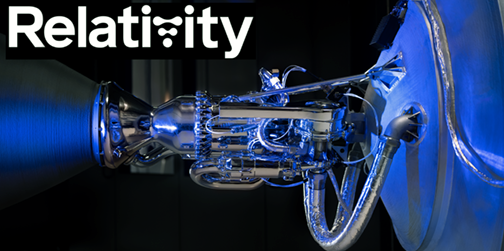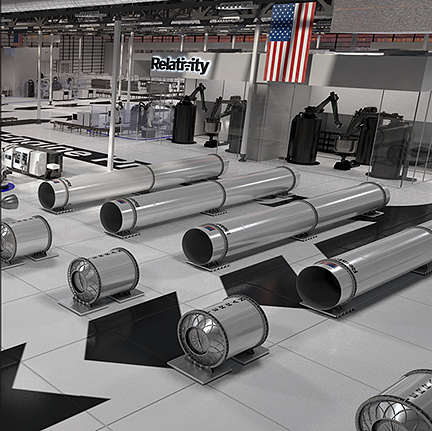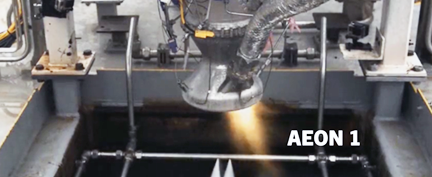
Relativity Space has closed a $140 million Series C funding round, led by Bond and Tribe Capital.
With this $140 million funding round, Relativity is now fully funded to become the first company in the world to launch an entirely 3D printed rocket to orbit and to enter commercial service in early 2021. The Series C round includes participation by new investors Lee Fixel, Michael Ovitz, Spencer Rascoff, Republic Labs, and Jared Leto, with participation from current investors Playground Global, Y Combinator, Social Capital, and Mark Cuban.

Relativity Space’s Stargate factory.
Photo is courtesy of the company.
Relativity is the only aerospace company to reinvent the rocket and the entire manufacturing value chain. The company is developing the Stargate factory, the first and only aerospace factory to integrate machine learning, software, and robotics with metal 3D printing technology, enabling Relativity to build and launch rockets in days instead of years. Built from raw material to launch-ready in less than 60 days with a payload capacity up to 1250 kg., Relativity’s Terran 1 rocket is now upgraded to a 3-meter payload fairing with 2x larger volume than before, making it the most competitive in its class and providing unique flexibility to satellite customers. Both the Stargate factory and Terran 1 are completely designed, built, and operated in the United States.
Since closing a Series B fundraising round in March 2018, Relativity has achieved key milestones across product development, government partnerships, and business momentum and is on track to commence commercial service in 2021. The company advanced its groundbreaking Stargate factory to expand print production capacity 4x and developed several larger next-generation Stargate 3D printers with optimized controls and software, improving scalability and adaptability to evolving customer needs.
Among the technology milestones achieved are building fully printed first and second stage structures, printing and assembling a second stage, successful and intentional burst testing of Stargate printed stage structures to demonstrate ability to hold pressure, completion of first turbopump tests, completion of more than 200 engine hotfire tests at NASA Stennis Space Center, completion of the avionics architecture and hardware testing, and completion of the Terran 1 vehicle system design and coupled loads analysis.
Relativity Space also deepened its pioneering partnership with the U.S. Government. Relativity became the first venture-backed company to secure a launch site Right of Entry at Cape Canaveral Launch Complex-16 from the U.S. Air Force, secured a 20-year exclusive-use Commercial Space Launch Act (CSLA) agreement for five NASA test sites including E3 and E4 and a 20-year exclusive use lease for a 220,000 square feet factory at NASA Stennis Space Center, and became the only venture-backed company on the National Space Council User’s Advisory Group advising the U.S. White House. Relativity expects to secure a polar and Sun Synchronous Orbit (SSO) capable launch site by the end of 2019.

Relativity also accelerated growth of its Terran 1 customer manifest, including leading global satellite operators, commercial companies, and government payloads. The company announced customer contracts with Telesat, the renowned global satellite operator, to support their LEO constellation; mu Space, the innovative Thai satellite and space technology company to launch their first LEO satellite; Spaceflight Industries, the leading satellite rideshare and mission management provider, to launch Spaceflight’s dedicated smallsat rideshares; and Momentus, the provider of in-space shuttle services, to launch Momentus’ small and medium satellite customers to GEO.
To scale operations for first flight, Relativity increased infrastructure from 10,000 square feet to more than 280,000 square feet of operations, production, testing, and launch facilities, and is on track to reach over 480,000 square feet of infrastructure in 2019. Since last year, the company increased team size 8x from 14 to 110 employees, and hired a senior executive team of renowned experts and seasoned leaders from top private space and technology companies, including Distinguished Engineer Tim Buzza, VP of Government Business Development Josh Brost, VP of Launch Vehicle Development David Giger, VP of Operations Tobias Duschl, VP of Avionics and Software Brandon Pearce, and General Counsel Laura Lariu.
Tim Ellis, Co founder and CEO of Relativity Space, said the company was founded with the long term vision of 3D printing the first rocket made on Mars and expanding the possibilities for human experience in our lifetime. With the close of this Series C funding, Relativity Space is now one step closer to that vision by being fully funded to launch Terran 1 to orbit as the world’s first entirely 3D printed rocket. Bond and Tribe are unrivaled partners in leading this funding round and the firm is excited to build this important future together with our entire team.

